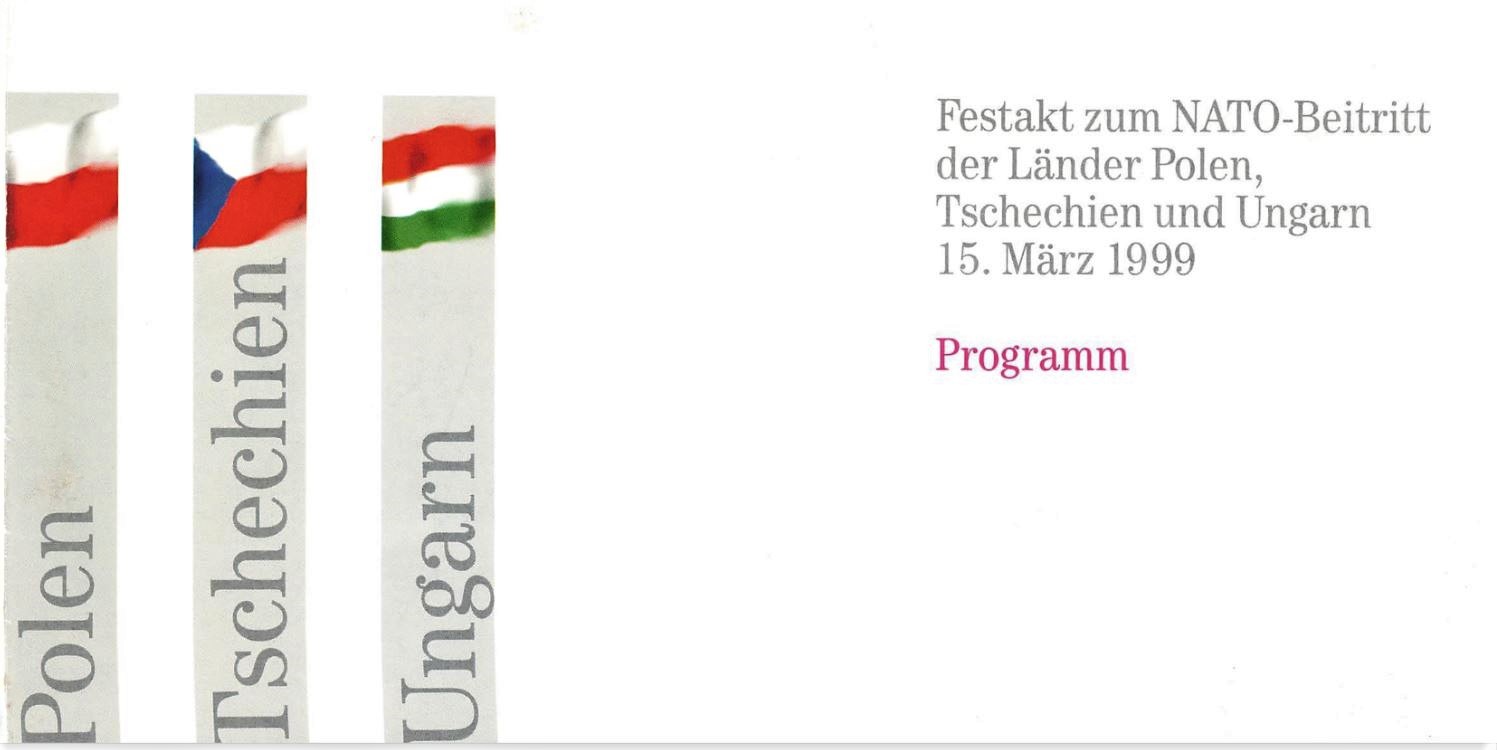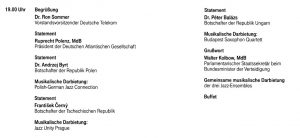Festakt zum NATO-Beitritt
der Länder Polen, Tschechien und Ungarn
15. März 1999
Programm
NATO-Osterweiterung
“Im Februar 1991 gründeten Polen, Ungarn und die Tschechoslowakei die Visegrád-Gruppe (nach Auflösung der Tschechoslowakei Anfang 1993 wurden die neuen Staaten Slowakei und Tschechien unabhängige Mitglieder der Gruppe, die nun auch kurz V4-Staaten genannt wird), um nach dem Ende von Ostblock und Kaltem Krieg die großteils gemeinsamen Probleme möglichst kooperativ zu lösen. Neben den gemeinsamen Interessen in Richtung EU- und NATO-Beitritt und verstärkter Zusammenarbeit auf den Gebieten Kultur und Wirtschaft ging es der Visegrád-Gruppe zudem um technische Kooperation und einige Fragen nationaler Minderheiten, die europäische Integration im Rahmen der Europäischen Union und der NATO voranzutreiben und Militärreformen im Einklang mit NATO-Standards durchzuführen. Die anfängliche Reaktion der NATO-Länder auf diese Annäherung von ehemaligen Ländern des Warschauer Paktes war zunächst skeptisch. Auf dem Gipfeltreffen in Rom im November 1991 einigten sich die V4-Mitglieder jedoch auf eine Reihe von Zielen wie Marktreformen und demokratische Liberalisierungen, die zum Beitritt führen könnten. In den folgenden Jahren wurden weitere Foren für die regionale Zusammenarbeit zwischen der NATO und ihren östlichen Nachbarn eingerichtet, darunter der Euro-Atlantische Partnerschaftsrat und die Partnerschaft für den Frieden.” ~ Quelle: Wikipedia
Venue
Headquarter Deutsche Telekom AG, Bonn
Weitere Informationen
Ceremony for NATO membership of Poland,
the Czech Republic and Hungary
NATO enlargement to the East
“In February 1991, Poland, Hungary and Czechoslovakia founded the Visegrád Group (after the dissolution of Czechoslovakia at the beginning of 1993, the new states Slovakia and the Czech Republic became independent members of the group, which is now also called the V4 states for short) in order to solve the largely common problems as cooperatively as possible after the end of the Eastern Bloc and the Cold War. In addition to common interests towards EU and NATO accession and increased cooperation in the fields of culture and economics, the Visegrád Group was also concerned with technical cooperation and some issues of national minorities, advancing European integration within the framework of the European Union and NATO, and implementing military reforms in line with NATO standards. The initial reaction of NATO countries to this rapprochement of former Warsaw Pact countries was initially sceptical. However, at the Rome Summit in November 1991, the V4 members agreed on a number of goals such as market reforms and democratic liberalisation that could lead to accession. In the following years, other forums for regional cooperation between NATO and its eastern neighbours were established, including the Euro-Atlantic Partnership Council and the Partnership for Peace.” ~ Source: Wikipedia




